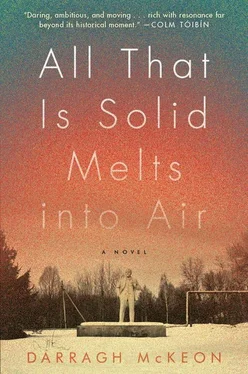“You, maybe. You’ve been out there, seen the country. Me, I even forget what the Arbat looks like.” Margarita looks around. “It must be six months since I’ve been down here. My own city.”
A trumpet player blasts out a solo, and they wait for him to finish. Margarita puts her fingers in her ears, attracting looks of scorn. The piano temporarily takes over, and the trumpeter twists the mouthpiece off his instrument, jabs the corner of his shirt in there, whirls it around, dumps spit from the body of the thing, buying time. He waits again for his moment, like a schoolboy with his hand up, eager to show off his abilities. When he finishes there’s a ripple of applause and Maria leans in close again.
“I’ve been to the hospital every day. They pass me from one desk to another. Nothing.”
“The hospital, please. Vasily hasn’t been paid in months. They’re refusing to look into it; apparently it’s not their responsibility. I took Sasha in to them, got her to pull up her shirt, show off her ribs. I thought I could guilt them into handing over something. But no, the woman didn’t even flinch. Now they just direct me to the ministry. So much paperwork. Pink and blue and yellow forms. Still no payment. I tell Vasily this when we speak; he says he’s made calls, he’s had senior people approach the ministry. He says they’re snowed under with administrative matters. There’s a lot to deal with, he says.”
“Meanwhile…”
“Exactly. Meanwhile.”
A few couples get up to dance, and the women watch them turn and sway.
Margarita speaks softly now, not taking her eyes off the floor. “Vera had a headache the other night so I sent her to bed early. Maybe it’s worry—who knows? I don’t want to think about it. You remember Vera?”
“Of course.”
“Anyway, she sleeps through the night and in the morning she doesn’t have time to do her homework. So I give her a note. She’s a good girl, Vera, she doesn’t want to get in trouble, already has her mind set on university, wants to wear a white coat like her father.”
A woman in grey rests her head on her husband’s chest, closes her eyes, rubs her hand along the back of his shoulders as they move.
“She comes home shaking. I’m wondering if it’s a fever, but there’s no temperature. Finally I get it out of her. Two men stop her on the way back, ask for the note. How they even know she has one is beyond me.”
“Maybe she was reading it on the street.”
“This is what I asked her, but no. She’s certain about it, and I don’t doubt her. She’s smart enough not to attract attention. But they stop her and they let her know they’re around, tell her if there are any other notes they’d like to see them.”
“She’s not so old.”
“And I have to ask myself.”
“That’s frightening for a kid.”
“I have to ask myself: why, if Vasily is doing their work, are they watching, listening, denying his family a decent meal? I mean, is this what it means to be a good citizen? I mean, we’re hardly a threat. I just don’t understand why they’re giving us all this attention.”
Margarita shakes her head, looks at her watch again.
Maria says, “I have a little money saved—very little—but I want you to have it.”
“Of course I can’t do this, you have your own struggles.”
“Grigory would want me to.”
“You have no responsibility to us.”
“I do. We are responsible for each other now.”
Margarita holds the sides of her chair, closes her eyes. “You coming out of nowhere. You don’t know what this means.”
After a moment Maria stands and says, “Please, it’s nothing. This is for me. If I can’t help Grigory, I can at least help you.”
Margarita rises too, takes her hand, kisses her cheek. “Be careful.”
“I will. You too. I’ll be in touch.”
“I’ll try to send word, let Grigory know you’re thinking of him.”
Maria doesn’t know what to do with her hands. She places them to her face, to her forehead, then takes them away. Hearing her say his name.
“Thank you. I didn’t want to ask. You have enough worries. Yes. Thank you.”
“Be careful. I mean it.”
“Yes. Of course, yes.”
They leave in separate directions and spend their return journeys looking around them, scrutinizing every face.
Yevgeni is coming back from rehearsal, and he makes his way home through the yards. Everything here is at a loss, all of it clapped out or cracked or just plain ugly.
The carcasses of car seats, and a one-wheeled cart, and old speakers with their cone-shaped diaphragms dragged out, and mattresses with their springs shot through, and plastic crates, and the only cars are burnt-out shells with no doors or wheels or fittings of any kind, just pure black skeleton.
Everything of local lore happens here. Shooting games and card games, human fights and dog fights.
He doesn’t quite walk through it, more around it, skirting the periphery, sidling alongside its hazards, because he likes to look; there is always something to look at. The days here are not made up of the usual things. No homework or dinner or laundry or shoe polishing or pictures of Lenin. Different rules apply here. You can spit on the pavement, for one. You can put your hand down your pants, for another. There are always guys talking in groups with their belts slung low and a hand down their front, guys with scars and shaved heads. You walk in a slow drawl here, you drag your feet, scuff your sole off the concrete. Yevgeni doesn’t do this. He’s a kid. He doesn’t have the requisite experience to carry it off. Some things he isn’t so clever about, but this is something he knows.
If you look hard and are lucky, there’s the possibility of seeing sex in progress, the actual act. Two kids from his class once saw a couple doing it against the wall, trousers around their ankles. Yevgeni couldn’t understand why they didn’t just take their pants off, but this was another element of the great secret that everybody talked about but no one really understood. But the validity of these claims is not in doubt, because everybody who has passed through—and all those who claim to have passed through—have seen the shrivelled-up condoms lying in the afternoon light, spent balloons, which, if you looked hard enough, or went close enough, had clear jism weighing down their ends, and careful if you inspect one of these with another kid, because the custom is to pick it up and slug the other guy in the face, and there are stories, too, of kids running home with matted hair. And the joke is that you’d never go bald. And the prospect of seeing the act in action, seeing a man and a woman enacting the thing, intrigues Yevgeni, intrigues him and disturbs him in equal measure, because this place has the lure of these kinds of possibilities, but he also knows that if he actually witnessed something like that he’d run home terrified.
He hasn’t come here to see sex. He hasn’t even really come here to see anything. He just wants to be on his own, out of the reach of neighbours and his mother’s spies. He wants to be somewhere where nobody is watching.
The recital is a month away now. He’s been asked to play Prokofiev’s “Tarantella” from Music for Children . A folk dance. A kiddie tune. How cute.
The evening has been explained to him. Yakov Sidorenko will play Prokofiev’s first three piano sonatas. Then Yevgeni follows with the Tarantella. The Tarantella is for spoiled brats whose parents trot them out when they have guests over. Look how well my Leonid or Yasha plays. He’s said this to his aunt Maria, but she’s told him he has no choice. Her boss has decided, and that’s what he needs to do. Yevgeni could tell she felt bad about it, though. Her voice drops off at the end of her sentences when she’s feeling guilty.
Читать дальше












